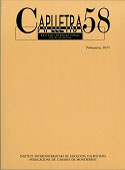Language games on stage
DOI:
https://doi.org/10.7203/caplletra.58.7177Keywords:
translation for the theatre, grammatical norms, registers, genuineness, expressive adequacy vs. adjustment to norms Abstract
Abstract
Abstract: This article deals with the presence on the Catalan stage of different versions showing a contrast of linguistic registers which contravene official language norms. The versions analysed are two theatre plays belonging to widely differing historical and socio-political contexts: Joan Oliver’s rendering (1957) of G.B. Shaw’s Pygmalion, and Joan Sellent’s version (2014) of Brian Friel’s Translations. Affinities and divergences are highlighted, both with regard to choice of linguistic material and to dramaturgical and ideological goals.
The frequent violation by both versions of the norms established by the Secció Filològica de l’Institut d’Estudis Catalans is ultimately intended to vindicate the genuine character, expressive force and dramatic effectiveness of a set of linguistic options that official norms are unwilling to accept.
Key words: translation for the theatre, grammatical norms, registers, genuineness, expressive adequacy vs. adjustment to norms.
 Downloads
Downloads
Downloads
Published
How to Cite
-
Abstract560
-
PDF (Català)238
Issue
Section
License
Authors submitting work to Caplletra for publication must be the legitimate holder of the usage rights. Legitimacy for the purposes of publishing the work must also include images, tables, diagrams and any other materials that may complement the text, whether they are the author of such material or not.
Copyright: on publishing their work in the journal, the author grants Caplletra. Revista Internacional de Filologia usage rights (reproduction, distribution and public communication) for both the paper printed version and for the electronic version.
All work published in Caplletra is covered by the Creative Commons license type Attribution-NonCommercial-NoDerivatives 4.0 (CC BY-NC-ND 4.0).
RESPONSABILITY
Caplletra. Revista Internacional de Filologia does not necessarily identify with the points of view expressed in the papers it publishes.
Caplletra. Revista Internacional de Filologia accepts no responsibility whatsoever for any eventual infringement of intellectual property rights on the part of authors.






